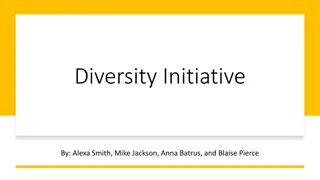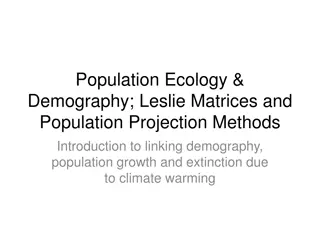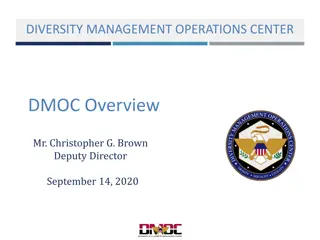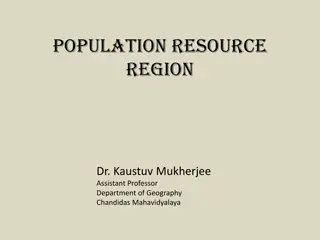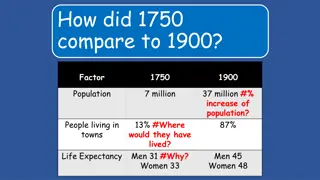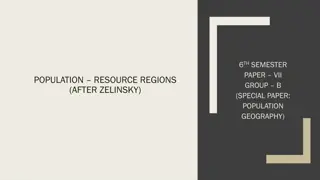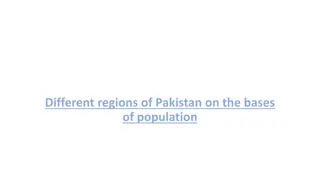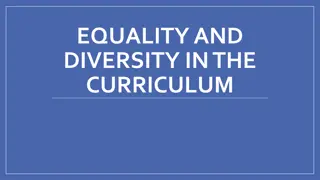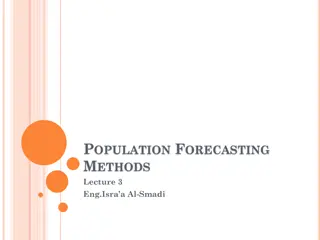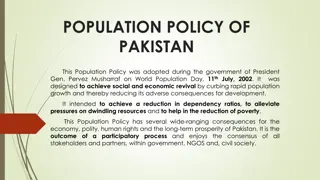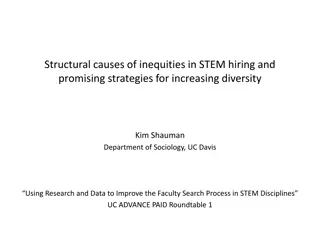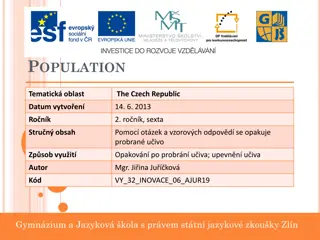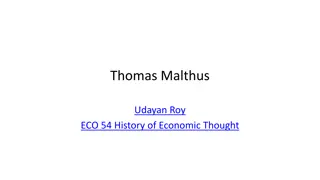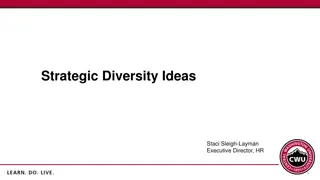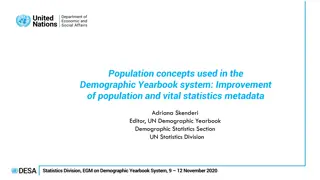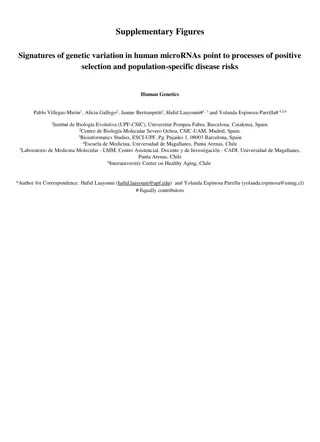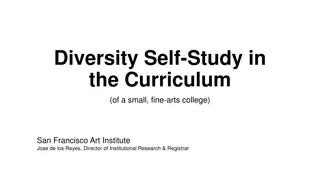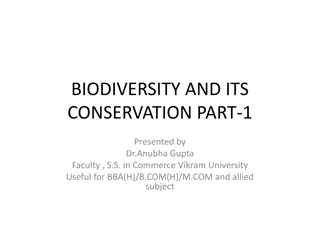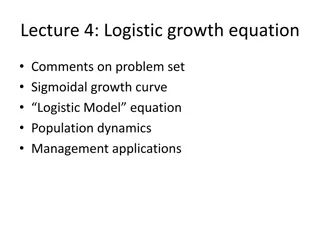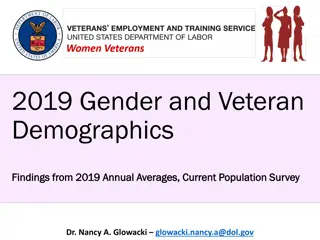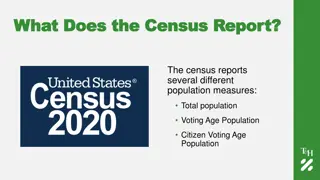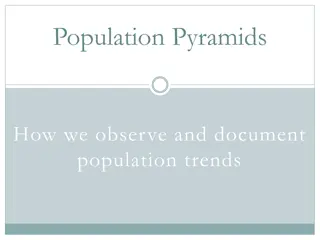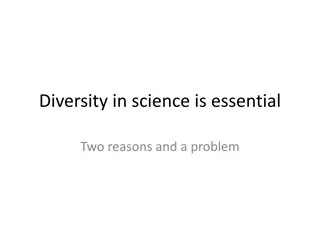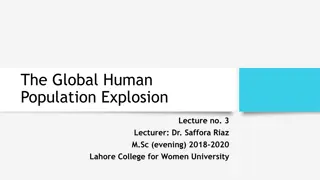Understanding Supplier Diversity: Grange Enterprise Program
Supplier Diversity is a proactive program at Grange Enterprise that encourages minority-owned businesses to participate in sourcing. This initiative, managed by Enterprise Strategic Sourcing, aims to promote diverse suppliers such as Black, Hispanic, women, veterans, LGBT, and non-Caucasian male-own
1 views • 6 slides
Overview of the South African National Population Register
The South African National Population Register (NPR) is a vital system maintained by the Department of Home Affairs. It serves to record and update information on the country's resident population, issue identity documents, and handle related administrative tasks. The NPR has evolved over the years
2 views • 16 slides
Promoting Diversity and Leadership Development Initiatives in Higher Education
This collection showcases various initiatives and programs aimed at promoting diversity, recruitment, and leadership development in higher education institutions. It includes images and descriptions of initiatives such as the Diversity Initiative, Applicants Diversity Recruiter, Sheetz Fellows Progr
4 views • 26 slides
NAYGN Local Chapter Lead Meeting Highlights and Initiatives
The NAYGN Local Chapter recently held a meeting led by Matthew Mairinger, COO of NAYGN Canada. The meeting covered various topics such as metrics, diversity & inclusion initiatives, professional development, book club, and staying active during COVID-19. The organization has launched a Diversity and
1 views • 18 slides
Understanding Population Ecology and Demography Through Leslie Matrices
Explore the critical aspects of population ecology and demography, focusing on factors influencing abundance, population growth, regulation, and the impacts of climate change. Learn about population projections, growth models, age-structured populations, and data requirements for estimating populati
4 views • 35 slides
Impact of Human Population Growth on Environment and Welfare
The rapid growth of the human population is placing immense pressure on the environment, leading to increased demand for resources like food, water, and shelter. The effects of human activity on the environment have escalated significantly over the years due to population expansion. High birth rates
0 views • 8 slides
DIVERSITY MANAGEMENT OPERATIONS CENTER Overview
The Diversity Management Operations Center (DMOC) is committed to achieving DoD mission success through promoting a culture of inclusion and diversity. Led by Deputy Director Mr. Christopher G. Brown, the DMOC executes diversity management programs, focuses on EEO investigations and resolutions, con
2 views • 11 slides
Way Forward on Transparent Tx Diversity in 3GPP.TSG-RAN.WG4#94-e-Bis Meeting R4-2005652
The meeting discusses the implementation of transparent Tx Diversity for uplink full power transmission in the context of 3GPP specifications for FR1 in Release 16 and beyond. It outlines the necessary changes needed to allow UE behavior of transparent Tx Diversity, test case adaptations, power scal
1 views • 11 slides
Introduction to Sampling in Statistics
Sampling in statistics involves selecting a subset of individuals from a population to gather information, as it is often impractical to study the entire population. This method helps in estimating population characteristics, although it comes with inherent sampling errors. Parameters represent popu
2 views • 24 slides
Understanding Population-Resource-Region Relationship: A Geographical Perspective
Explore the intricate relationship between population, resources, and regions through a geographical lens. Delve into classifications based on population, resources, and technology, with examples from different countries and regions. Discover the concepts of optimum population, over-population, and
1 views • 11 slides
Understanding Demography: Population Trends and Analysis
Demography is the study of population size, distribution, and composition, encompassing elements such as mortality, natality, migration, and demographic forces. Population census plays a crucial role in collecting and analyzing demographic data, with methods like De Jure and De Facto census. Inter-c
6 views • 21 slides
Comparing 1750 to 1900: Population Growth in Britain
The population of Britain saw a significant increase between 1750 and 1900. In 1750, the population was 7 million, and by 1900, it had grown to 37 million. This represented an 87% increase. The number of people living in towns also rose from 13% to a higher percentage. Factors contributing to this g
0 views • 6 slides
Unlocking the Power of Diversity in the Workplace
Discover the significance of valuing diversity in the workplace through the University of Texas Employee Assistance Program's insightful presentation. Learn about the impact of diversity, its benefits, and strategies to leverage differences for improved teamwork, productivity, and overall results. E
0 views • 28 slides
Population Resource Regions and Zelinsky's Classification
Geographers have long studied the relationship between population growth and resource adequacy, leading to the concept of Population Resource Regions (PRR) by W. Zelinsky. Zelinsky identified five types of PRR based on population-resource ratios, ranging from Type A with high resource utilization po
0 views • 8 slides
Population Distribution in Different Regions of Pakistan
The population distribution in Pakistan varies significantly among different regions, with certain provinces like Punjab and Sindh having higher population densities compared to Baluchistan and FATA. The rural areas are also categorized into different population density regions based on the number o
0 views • 14 slides
Promoting Equality and Diversity in the Curriculum
In the pursuit of an inclusive curriculum that values diversity, this resource explores the principles and practices of embedding equality and diversity in education. It delves into the importance of recognizing and promoting diversity in sources of knowledge, ensuring relevance and engagement, fost
0 views • 9 slides
Methods of Population Forecasting for Urban Development
Designing water supply and sanitation schemes for cities requires accurate population forecasting. Factors influencing population changes include births, deaths, migration, and annexation. Various methods like Arithmetic Increase, Geometric Increase, and Ratio Method are used to predict population g
4 views • 24 slides
Understanding the Concept of Population and Unit Stock
The concept of population revolves around all organisms of the same species living in a specific area capable of interbreeding. It is essential to differentiate between sample populations and real populations to accurately study their attributes such as birth rates, death rates, and spatial dimensio
0 views • 15 slides
Population Policy of Pakistan: Vision, Goals, and Strategies
The Population Policy of Pakistan, adopted in 2002, aims to stabilize the population by 2020 through a focus on reducing fertility rates and promoting family planning. The policy outlines goals such as achieving a balance between resources and population, increasing awareness of rapid population gro
0 views • 11 slides
Regional Gender and Diversity Network Initiatives in Southeast Asia
The Southeast Asia Regional Gender and Diversity Network focuses on promoting gender and diversity initiatives within National Societies. The network conducts teleconferences, annual meetings, and capacity-building sessions to enhance collaboration and strategic direction. Through the endorsement of
0 views • 11 slides
Understanding Structural Causes of Inequities in STEM Hiring for Increased Diversity
This presentation by Kim Shauman from UC Davis delves into the structural influences that impact diversity levels in STEM faculty recruitment. It highlights factors such as the supply of diversity in the pipeline, representation of women and underrepresented minorities among STEM doctoral degree rec
2 views • 20 slides
Exploring Population Data of the Czech Republic
The data presents insights into the population of the Czech Republic, including demographics, language distribution, religious beliefs, literacy rates, life expectancy, and urban population percentages. The population pyramid reveals a dominance of people in the age group of 20-49, with longer life
0 views • 8 slides
Thomas Malthus and His Theory on Population Growth
Thomas Robert Malthus, an influential economist, proposed a theory on population growth in the 18th century. His theory suggested that population grows exponentially while food production increases at a slower rate, leading to inevitable food scarcity. Malthus also discussed the concept of preventiv
2 views • 19 slides
Understanding Diversity and Culture in South Africa
Exploring the rich diversity and cultural heritage of South Africa, this content delves into the significance of respecting diversity in the classroom and workplace. It highlights the various ethnic groups, languages, and cultural expressions that contribute to the unique identity of the 'Rainbow Na
0 views • 26 slides
Understanding Cultural Diversity and Its Importance in Society
Cultural diversity encompasses the variety of human societies and cultures worldwide, shaping unique identities and fostering exchange of ideas. Embracing diversity promotes innovation, creativity, and mutual understanding. However, issues like stereotypes, lack of familiarity, workplace tensions, a
0 views • 11 slides
Enhancing Diversity and Inclusion in University HR Practices
University HR is implementing strategic initiatives to enhance diversity and inclusion, focusing on policy, procedures, position descriptions, search committee composition, and strategic goals. Emphasizing collaborative processes and a commitment to diversity, the university aims to increase retenti
0 views • 10 slides
Louisiana Parish Population Statistics 2010
Louisiana Parish Population Statistics for the year 2010 reveal varying population numbers across different regions. The data provides insights into demographic changes and trends over the past decade. The total population change by parish and age group highlights shifts in different age brackets. T
0 views • 42 slides
Improvement of Population and Vital Statistics Metadata in the Demographic Yearbook System
The Demographic Yearbook system focuses on enhancing population and vital statistics metadata to ensure accurate and concise reflection of population concepts across 230+ countries. It involves annual collection of official national population estimates, vital statistics, and UN international travel
0 views • 16 slides
Signatures of Genetic Variation in Human microRNAs Point to Selection and Disease Risks
Genetic variation in human microRNAs indicates processes of positive selection and population-specific disease risks. The study explores miRNA diversity, transposable elements, nucleotide diversity, and population-specific SNP patterns. Insights into population genetics and disease susceptibility ar
0 views • 6 slides
Diversity Self-Study in the Curriculum of a Small Fine Arts College
San Francisco Art Institute conducted a diversity self-study in 2015-16 to address concerns about diversity and inclusivity in the curriculum. The study aimed to align with the college's Diversity Statement and Institutional Learning Outcomes, utilize assessment tools, and promote diversity, equity,
0 views • 35 slides
Building Diversity in PRSSA Chapters: A Comprehensive Approach
This content showcases how a PRSSA chapter focused on diversity and inclusion by adding a Diversity and Inclusion Director to their eboard, recruiting students from various schools, engaging with high school students, collaborating with PR firms, and partnering with the school's diversity and inclus
0 views • 12 slides
Understanding Biodiversity and Conservation
Biodiversity refers to the variety of living organisms and ecosystems. It includes genetic diversity, species diversity, and ecosystem diversity. Genetic diversity plays a crucial role in adaptation and evolution, while species diversity reflects the richness of different species in a region. Conser
2 views • 11 slides
Understanding Logistic Growth in Population Dynamics
Explore the logistic growth equation and its applications in modeling population dynamics. Dive into the concept of sigmoidal growth curves and the logistic model, which reflects population growth with limits. Learn how to calculate population change using the logistic growth equation and understand
0 views • 26 slides
Insights on 2019 Gender and Veteran Demographics
Analysis from the 2019 Annual Averages of the Current Population Survey reveals significant statistics regarding gender and veteran populations in the United States. Data indicates that veterans comprise 7.5% of the overall population, with women veterans totaling almost 2 million. Women veterans ma
0 views • 48 slides
Understanding Population Genetics: Mutations, Variability, and Evolution
Explore the fascinating world of population genetics, covering key concepts like the history of population genetics, mutation types, measurement of variability, and mutation rates. Delve into the diverse mutations such as substitutions, insertions, deletions, and duplications, along with how these v
0 views • 47 slides
Overview of Population Measures and District Data from Census Reports
The census reports various population measures including total population, voting age population, and citizen voting age population. The data includes breakdowns by ethnicity for each trustee district. Changes in voting and citizen voting age population percentages are also provided. Data is sourced
0 views • 4 slides
Understanding Population Pyramids for Analyzing Population Trends
Population pyramids are graphical illustrations that showcase the distribution of age groups within a population, segmented by gender. By observing and documenting the patterns of population pyramids, one can discern trends such as rapid growth, slow growth, or negative growth, which are influenced
0 views • 7 slides
Embracing Diversity in Science: Opportunities and Challenges
Diversity is crucial in science for varied perspectives, interpretations, and tools leading to breakthroughs. Future scientists must be drawn from a diverse talent pool. However, there's a problem in underutilizing diverse talent in the scientific workforce. Initiatives like Purdue University's stra
0 views • 23 slides
Maine Workforce and Population Trends Analysis 2014-2024
Maine's workforce and population outlook from 2014 to 2024 reveals a decline in births, resulting in an aging population and workforce imbalance. The state faces challenges due to low birth rates, negative natural population change, and minimal net migration, impacting labor force growth and total p
0 views • 31 slides
The Global Human Population Explosion: Causes and Implications
The lecture explores the rapid increase in the global human population post-World War II, analyzing factors such as birth rates, mortality rates, and life expectancy. Various counterarguments are presented, including the debate on population growth benefits, ethical concerns over reproductive interf
0 views • 20 slides


